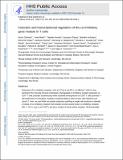Induction and transcriptional regulation of the co-inhibitory gene module in T cells
Author(s)
Regev, Aviv
DownloadAccepted version (3.168Mb)
Terms of use
Metadata
Show full item recordAbstract
The expression of co-inhibitory receptors, such as CTLA-4 and PD-1, on effector T cells is a key mechanism for ensuring immune homeostasis. Dysregulated expression of co-inhibitory receptors on CD4+ T cells promotes autoimmunity, whereas sustained overexpression on CD8+ T cells promotes T cell dysfunction or exhaustion, leading to impaired ability to clear chronic viral infections and diseases such as cancer 1,2. Here, using RNA and protein expression profiling at single-cell resolution in mouse cells, we identify a module of co-inhibitory receptors that includes not only several known co-inhibitory receptors (PD-1, TIM-3, LAG-3 and TIGIT) but also many new surface receptors. We functionally validated two new co-inhibitory receptors, activated protein C receptor (PROCR) and podoplanin (PDPN). The module of co-inhibitory receptors is co-expressed in both CD4+ and CD8+ T cells and is part of a larger co-inhibitory gene program that is shared by non-responsive T cells in several physiological contexts and is driven by the immunoregulatory cytokine IL-27. Computational analysis identified the transcription factors PRDM1 and c-MAF as cooperative regulators of the co-inhibitory module, and this was validated experimentally. This molecular circuit underlies the co-expression of co-inhibitory receptors in T cells and identifies regulators of T cell function with the potential to control autoimmunity and tumour immunity.
Date issued
2018-06Department
Massachusetts Institute of Technology. Department of Biology; Koch Institute for Integrative Cancer Research at MITJournal
Nature
Publisher
Springer Nature
Citation
Chihara, Norio et al. “Induction and transcriptional regulation of the co-inhibitory gene module in T cells.” Nature 558 (2018): 454-459 © 2018 The Author(s)
Version: Author's final manuscript
ISSN
0028-0836